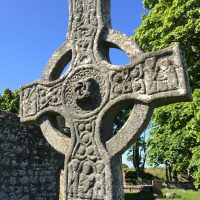Reflection by Revd Sue McCoan
This week, we leave the Easter story. For the next few weeks, up to Pentecost, we’ll be looking at some of the things Jesus said about himself, and about his followers. Today, we have Jesus using the image of sheep and shepherds.
There are a lot of shepherds in the bible, from Abraham with his flocks and herds, through to the shepherds who were first to hear of the birth of Jesus. In the Psalms, and in the prophets like Isaiah and Ezekiel, shepherds are often used as an image of leadership. But in the older stories we see sheep farming much more as a business. You remember the story of Jacob, who was told he could keep all the striped and spotted lambs, so he set about breeding striped and spotted sheep – hence Jacob sheep – and made himself very wealthy.
Sheep are an investment. It takes months for a lamb to grow big enough to eat; months more before the ones that aren’t eaten can breed; and if you are keeping them for wool or milk they can live for 10-12 years. During that time you need to keep each animal healthy, and build up the health of the flock. If one gets injured or killed, you’ve lost the sheep and all the feed and care that you’ve spent on it.
In our Bible reading, Jesus is talking about his investment in his people.
Bible reading John 10:1-10
There are two separate images in this reading: Jesus the shepherd who uses the gate, and then Jesus as the gate himself.
Palestinian sheepfolds – and you get them in this country too, in the Lake District and Dales – are stone-walled, usually round, no roof, with a gap in the wall for the sheep to get in. At night, the sheep can go into the fold and the shepherd needs only to guard the entrance. Sometimes, they would sleep across the entrance, so the sheep couldn’t stray out.
Jesus describes himself, in the first part, as the shepherd who spends time with his sheep – who invests in them. He takes them into the fold, he calls them out. And because he has spent time with them, they know his voice. They follow. Other people can look as if they care; other people can seem to have a message of hope, can offer enticing ideas. But they have no substance because they haven’t built up any relationship. In being born human. Jesus has invested in us, in our lives. He has put the time in, getting to know our humanity; he has lived what he preaches. He knows us, and therefore we can trust in him. We can listen to his voice, and follow where he leads us, confident that he knows what we truly need.
In the second part of the reading, where Jesus describes himself as the gate, he takes the idea further. Sheep in the sheepfold are safe, but they’re not meant to stay there. They are kept safe so they can go out and live – they can find pasture, and freedom, and whatever counts as a full life for a sheep. Jesus saves, not so that we can cling to safety, but so that we too can get out there and live. I have come, he says, that they may have life and have it abundantly.
..
That might sound a mean thing to say at this time, when we can’t get out, and some people are really struggling to keep going never mind have any sort of abundant life. But I want to stay with the idea of investment, as something that might help us, even in this time of restriction.
The shepherd invests time and energy to help his sheep thrive. Jesus spent 30 years or so doing nothing very special, investing in being human, before he started preaching. We have, as a country, invested heavily over the last 6 weeks to limit the spread of the coronavirus. We have put in our time and energy, in some cases our business, our health, our family relationships, all that upfront cost – trusting that it will pay out in the not-too-long term. If we give up too soon, we blow our investment – we waste everything we put in so far. So let’s bear with it a little longer, those of us who have to still stay indoors, let’s hold our nerve, hard though it may be, for the sake of those who do have to go out; for the sake of those who have already paid the ultimate price.
But while we are investing in our national health, let’s not forget that Jesus is also investing in us. Jesus gave his time to us so that we could flourish, we could have abundant life. That might not mean success in any worldly terms; it might not mean a comfortable life – it certainly didn’t for the early church. Abundant life is a life lived in the sure knowledge that God loves us and is with us, no matter what. Maybe, in these strange days, we can invest some of our time in really taking this on board.








